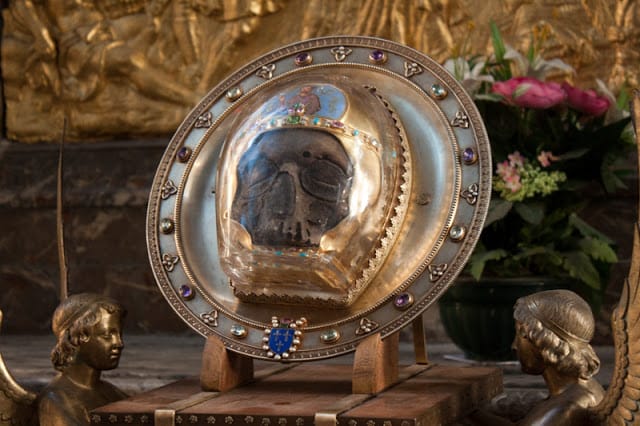Relics and Sacramentals are Catholic Superstition
The use of relics and sacramentals by Catholics is neither superstitious nor idolatrous, and here's why.

If you've had any interactions with Protestants, especially online, you've heard the numerous objections they have to the Catholic faith. However, the one I'm focusing on for this post is the claim that relics and sacramentals get in the way of a true relationship with Jesus.
Many Protestants see relics and sacramentals at best as superstitious and at worst, idolatry.
They ask questions like, “Why would you treasure a bone, a piece of clothing, or a medal—doesn’t that distract you from Christ?”
However, the Church doesn’t teach that relics or sacramentals have magical powers on their own. They’re signs, physical reminders of God’s work in the world. The truth is that sometimes God chooses (as we’ll see) to bestow grace, healings, and such through physical objects.
What I’m going to argue is that things like relics and sacramentals—physical objects—are not only part of Church tradition, they’re scriptural, which should be enough to satisfy the “Bible only” crowd.
First off, how do Catholics understand relics and sacramentals, and what does the Church teach about them? Here’s what the Catechism says.
Relics The Catechism says that honoring saints and their relics is important, not because they’re divine in and of themselves, but because they connect us to the holy men and women who devoted their lives to Jesus. (CCC 1674-1675).
Sacramentals These are sacred signs instituted by the Church. Sacramentals like the rosary, scapulars, holy water, blessed candles, medals, etc., prepare us to receive grace and help us cooperate with it. (CCC 1667).
Here are some common Protestant objections you might hear.
Objection 1: It’s Idolatry to Bow Before a Relic or Kiss a Crucifix
Many Protestants see any outward gesture of reverence as worship. To them, kissing a relic or genuflecting before a crucifix is equal to worshipping an object.
The Church, however, makes a clear distinction between latria (the worship due to God alone) and dulia (the honor given to saints). Relics are honored, not worshipped, in the same way you might keep a treasured family heirloom or even the ashes of a loved one (or even a pet) who’s passed.
A Catholic kneeling before a crucifix isn’t worshipping the wood and metal, but honoring Christ, whom the cross represents.
Objection 2: There’s No Biblical Basis for Relics or Sacramentals
Since Protestants are “Bible only”, meaning if it’s not mentioned in scripture, it’s not relevant to the faith. They also cite passages about worshipping idols from the Old Testament to make their case.
But here’s the thing: the Bible is filled with examples where God used material objects to bring blessings and healings. For example:
- Moses’s staff parted the Red Sea (Exodus 14:16).
- The bronze serpent healed those who gazed on it (Numbers 21:8-9).
- A man came back to life after touching Elisha’s bones (2 Kings 13:20-21).
- Paul’s handkerchiefs brought healing (Acts 19:11-12).
- Jesus uses mud to heal a blind man (John 9:1-12).
That last one is particularly interesting because Jesus was fully God and fully man. He could’ve easily willed the man’s sight to return, but chose to do it by scooping up mud and rubbing it on the man's eyes.
In all of these instances, God could’ve acted directly, but chose to do it through physical objects.
And why not? God created matter, and matter is good. We live in a physical world, and humans need physical connections. Sure, a FaceTime visit with your grandkids is fine, but it's nowhere near as comforting as being able to give them a big, real-life hug.
When you think about it, the Divine is mysterious, unfathomable, and impossible for us to comprehend with our limited minds fully. Being able to hold or venerate a relic or use a sacramental in our daily prayer life gives us a small, albeit meaningful, connection to God.
So the question for your Protestant friends is: If God worked through physical objects, then why would He stop now?
Objection 3: Christ is the Only Mediator—We Don’t Need Relics
Some Protestants might worry that reverence for relics distracts from Jesus’ unique role as mediator. But as the Church points out, the relics don’t replace Christ—they point to him. Relics remind us of the saints, who always lead us to Christ.
Sacramentals are meant to stir our faith and devotion. Holding a rosary or prayer card as you pray is similar to holding a photo of your children and thinking about how much you love them.
These things are meant to help us cooperate with God’s grace, not replace it.
Objection 4: It Looks Like Superstition
It’s common to hear Protestants say that Catholics treat sacramentals like “lucky charms” or magical objects, and it’s true that some Catholics wrongly look at them this way.
The Church warns against superstition (CCC 2111).
Superstition is the deviation of religious feeling and of the practices this feeling imposes. To attribute the efficacy of prayers or of sacramental signs to their mere external performance, apart from the interior dispositions that they demand, is to fall into superstition.
Holy water, medals, scapulars, and relics aren’t magic; they’re spiritual tools that prepare our hearts to receive God’s grace.
Remember, that when we Catholics honor relics or use sacramentals, we’re not turning away from Christ; we’re turning toward Him, using the reminders he’s given us through His Church.
Finally, God loves matter because He made it and gave it to us to show us His glory. He used matter in the past, and he uses it today.
If you're interested in relics, check out The Relic Project.





